Coaching Quote of the Day 16th September 2013
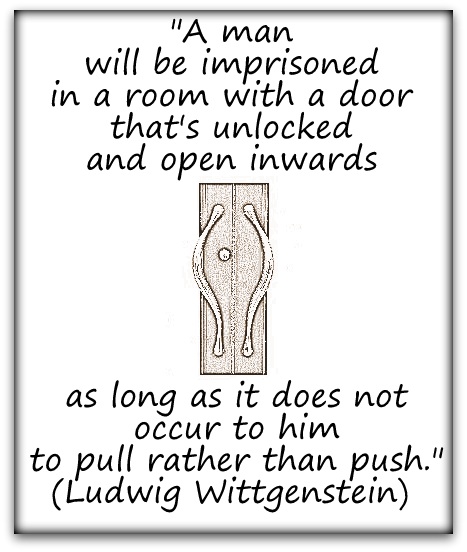
“A man will be imprisoned in a room with a door that’s unlocked and opens inwards as long as it does not occur to him to pull rather than push.”
(Ludwig Wittgenstein)

“A man will be imprisoned in a room with a door that’s unlocked and opens inwards as long as it does not occur to him to pull rather than push.”
(Ludwig Wittgenstein)
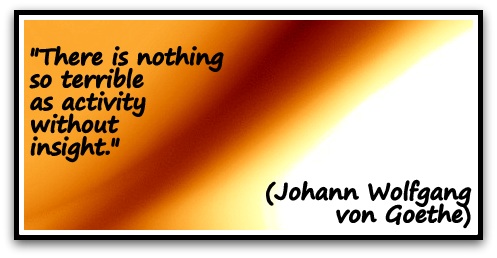
“There is nothing so terrible as activity without insight.”
(Johann Wolfgang von Goethe)
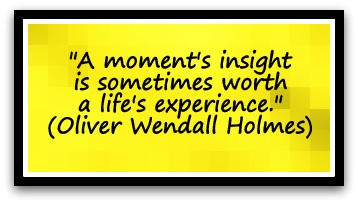
“A moment’s insight is sometimes worth a life’s experience.”
(Oliver Wendall Holmes)
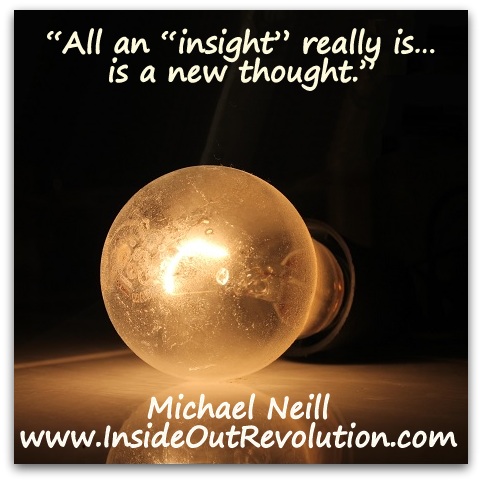
“All an “insight” really is…is a new thought.”
(Michael Neill, www.InsideOutRevolution.com)
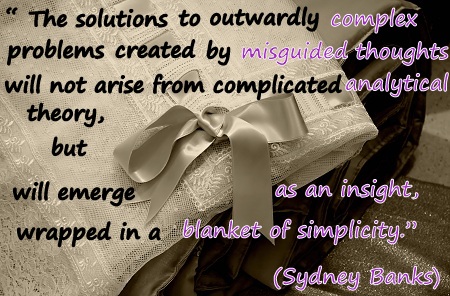
“The solutions to outwardly complex problems created by misguided thoughts will not arise from complicated analytical theory, but will emerge as an insight, wrapped in a blanket of simplicity.”
(Sydney Banks)
Transformative Coach Katri Manninen shares her thoughts about coaching and clients insights in today’s guest post:
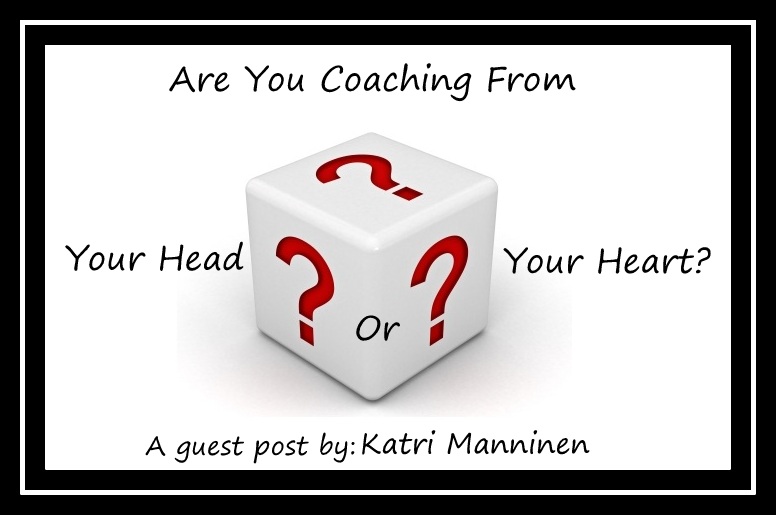
Have you ever noticed, how sometimes a random statement you make without thinking seems to cause your client to have a major insight? Or even worse: your client shrieks joyfully “Oh, that’s it! I get it! Thank you!” …and you have no idea what you just said?
How many times you have thought you fully understand what is going on with your client, but when you explain it to them, they stare at you as if you just said sun doesn’t exist? Or even worse, they mutter something like “yeah, but…” and then go on a rant that proves your point wrong? Suddenly the mood in the room becomes tense and oppositional and you feel that you lost the connection to your client.
I have experienced the both scenarios, and for the first year I was coaching it puzzled me. How could I help my clients to have more insights, when I didn’t know how I had helped to have their initial insights? How could I stop myself from ruining the good feeling between me and my client when I felt the urge to help them?
Then I joined Michael Neill’s Supercoach Academy [www.supercoachacademy.com] and learned the three principles behind the human experience. I learned when to speak and when to shut up by noticing where my thoughts and words seemed to come from. Were they coming from my heart: my inner wisdom and the intelligent energy behind life — or from my head: my personal intelligence, opinions, judgements and prejudices?
When I’m speaking from my heart, I feel grounded and open. My body feels relaxed and light. My mind is calm and clear. The words and thoughts seem to be coming deep inside me, from my gut or my heart. Or more precisely: they feel like they’re coming through me, not from me.
When I’m in the heart-space, I’m often surprised by what I say — and so are my clients. I just seem to know instinctively what to ask — and when to be quiet — even when it doesn’t make sense to me.
When I’m speaking from my head, I’m thinking a lot. Sometimes so much I don’t really hear the client anymore. All my thoughts seem to be coming from my head. I may feel energetic and enthusiastic, but if I listen closely to my body, I notice my body is tense and closed.
When I’m in the head-space, my words are calculated and statements manipulative. I feel like a puppeteer trying to pull the right strings to make my client to see what’s best for them. I feel smart and important… That is, until my “wisdom” fails to hit its target and my eagerness to help the client ruins the mood in the room.
When I’m speaking from my heart, I don’t care if my clients get what I’m saying or not. I know that they have access to the same infinite wisdom as I do, and that they will eventually find the answers they’re looking for. My job is just to be present and point them to the right direction. That’s all.
When I’m speaking from my head, outcome is everything. I want my clients to understand me. I have a need to add value and make a difference. If they resist my suggestions, I feel irritated or disappointed. I start to think that either I’m a failure or they’re “un-coachable”.
Today I do most of my coaching from my heart. Yes, sometimes I fall into the trap of my own thinking and have an irresistible urge to say something smart or give advice. The minute I notice what I’ve done, I laugh at myself — sometimes out loud.
This new approach has made coaching feel light and easy while my clients are having amazing breakthroughs. This understanding has also changed my marriage and other relationship. It’s mind-blowing how seldom people really need my opinions and advice — and how often just being present and loving is more than enough.
Katri Manninen is a Transformative Coach (™) on a mission. Her goal is to create Fearless World 2022 by teaching three principles and helping people to tap into their inner wisdom. She has committed to being The Most Powerful Coach in the World by being fully present and open with all of her clients — regardless if they’re desperate housewives she’s coaching pro bono or successful entrepreneurs with multi-million businesses.
If you understand Finnish, check out her website: www.kutri.net . If you’d like to experience the space where miracles can happen, email her: ku***@***ri.net
Background on Image above title via: FreeDigitalPhotos.net
In this weeks guest post, talent coach, Richard Nugent shares his expertise and approach to “motivational coaching”.
by Richard Nugent
As a coach with a background in NLP and a bucket full of other positive psychology you would think that my clients would regular be coached to ‘think positive’. After all that’s what us ‘motivational coaches’ do right?
However I think that ship has sailed. Many perspective clients have tried the whole positive thinking thing and it hasn’t really worked for them. Where does that leave us? I don’t think that positive psychology should be ditched and we should go back to the days of trawling through clients’ past for sessions upon end to enable their future. Instead I think as a profession we should look for new distinctions in the field to help our clients think more clearly.
My experience of 3 principles based work has certainly helped me become more aware of my thoughts and the ‘reality’ that they create for me. This in turn has of course helped me create new insights and more distinctions for clients. Here is a very simple example of this in action.
A recent meeting in the south meant a 5am start for me and a ninety minute drive either side of a full day of thinking, challenging and learning. My return journey to the airport was halted by a closed motorway and after a lengthy spell stuck in traffic and a missed flight the realisation that a five hour drive home beckoned. I was speaking to a client during the trip back up north who asked how I managed to be positive even at a time like this. It struck me that having to think positive as well as driving safely, finding my way home and communicating with my family just felt like an extra chore.
For me the distinction between positive thinking and useful thinking is a small but powerful one. I became aware that ‘getting positive’ about not getting home until 1am after a long day would be a task, however also being aware that being unhappy, angry or blaming the world for it would not get me home any quicker at all. Acceptance of the situation, gratitude that I had been delayed by an accident rather than involved in it and a focus on being present in the task (driving safely) was a much more useful frame. Notice the ‘useful’ frame rather than positive.
Those of you who are experienced coaches this awareness of thought should not be new, but my experience of sharing the distinction with a client – and an experienced client at that – highlighted again that we are lucky enough to have insights that are natural and obvious to us that others aren’t aware of.
Try this simple exercise.
Reflect on your last five coaching sessions
List the interventions, solutions or models that you used to move you clients close to where they want to be
Now chunk this list a step further, ‘stuff other coaches probably know’ ‘stuff most clients know’ ‘stuff not many other people on the planet know’.
You could probably use this as a catalyst for an article or even product but for me the purpose of this is simply to become more consciously aware of your own thinking and your thoughts.
My guess is that as you explore your thinking, you will find that you have your own pretty unqiue take on positive thinking which helps your clients create more of the world that they want. It is unlikely to be directly aligned with early nineties ‘happy clappy high fives all round’ approach nor is it likely to be the ‘sit where you are, think positive and all will come to you’ approach popularised in the last decade. Whatever your philosophy is in this specific area can you describe your distinction?
I would love to hear it (email ri*****@*************ng.com) and I bet your clients would too.
Richard works with talented people in the fields of business and sport – and has been for almost a decade. Those who he has worked with all say the same thing: they have achieved more than they thought was possible because of his support and insight.
He has helped leaders in international brands such as Lego, Merlin Entertainments and Tesco to realise their potential while his work with professional footballers, managers and cricketers has led to trophy winning performances and multimillion pound transfers.
Entrepreneurs with the commitment to work with Richard reshape businesses, unlock the secrets of financial success and discover the answer to the ultimate question for business owners – how do I balance my work and personal life?